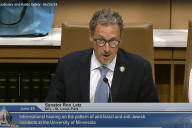You have /5 articles left.
Sign up for a free account or log in.
On July 1, in Idaho, Harv Lyter stepped in as proprietary schools coordinator, filling for the first time a new state position dedicated to overseeing the for-profit college sector. The next day -- having prepared for the job for several months -- he sent letters to Breyer State University and Canyon College, indicating that they were not registered in accordance with Idaho law.
"The bottom line is they know if they went through the registration process, they would be turned down,” Lyter said. “Neither of those schools is properly accredited by an accrediting agency recognized by the U.S. Department of Education or the Council for Higher Education Accreditation and/or the State Board of Education in Idaho.”
Meanwhile, in California, July 1 marked one year since the bureau charged with regulating proprietary colleges was shuttered, since the law regulating that 400,000-student sector had expired. Since then in Sacramento, debate on a permanent fix has deadlocked. Even a temporary bill allowing colleges to enter into voluntary agreements to comply with lapsed regulations expired, on July 1 of this year.
While Idaho was cracking down, California's system had cracked.
Since July 18, Breyer State University has been incorporated in California, with a Los Angeles address. Canyon College of Idaho filed as a California corporation August 5; its new address is 4017 Garfield Ave, Carmichael, Calif. Both institutions had told Lyter that they’d be opening up shop in California, he said -- although his primary concern is ensuring they don't continue to operate without state approval in Idaho, too.
The colleges, he said, are “looking for more fertile ground.” (Breyer State, which has a history in Idaho, seems to have established itself in its third state this year. Alabama officials declined to renew its license this spring; its latest corporation filing in Idaho is dated June 26.)
The gap in regulation in California “gives these guys a window of opportunity,” Lyter said. “And the unfortunate part is that it will probably be more difficult to get them out once they’re in than it would have been to have kept them out in the first place.”
Phil Braun, director of administrative services at Canyon, said the college's lawyer would have to speak on the issue of its relocation (when pressed about whether they're located in California, however -- the college's own Web site has a California address -- Braun said, "that is our mainstay, yes").
Braun characterized Canyon as an independent college that operates without federal money. A message left at the main number for Breyer State was not returned Monday afternoon.
UPDATE: Senate Bill 823, a hotly controversial measure that would replace the expired regulatory apparatus, failed Monday under reconsideration in California's Legislature. While the bill has enjoyed support from consumer advocates, it is disliked by many in the for-profit college sector, and opposed by the state's Department of Consumer Affairs, which housed the now-defunct bureau charged with regulating proprietary colleges.
When the original Private Postsecondary and Vocational Education Reform Act of 1989 expired last year, some feared that California, which in the 1980s had the dishonor of being called “the diploma mill capital of the world,” could once again become a haven for colleges of questionable quality.
Russ Heimerich, a spokesman for the Department of Consumer Affairs, said Monday that the department is no longer tracking colleges that are coming into the state.
Unless a college contacted them, “We wouldn’t even know about a new school coming in."








